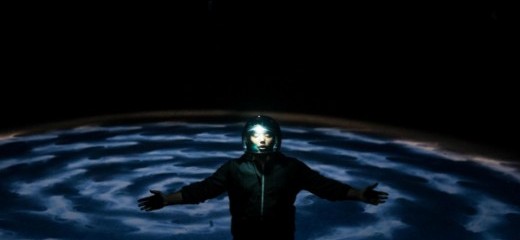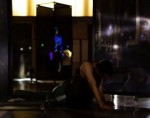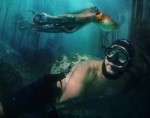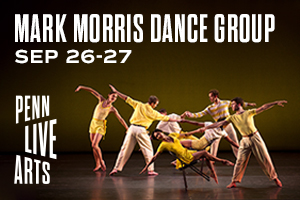
Montpellier Danse Festival: Postcards from France
by Ellen Chenoweth
Sharon Eyal and Gai Behar, OCD Love
The venue stole the show before the curtains even parted. The Opéra Comédie, which opened in 1888, is a scrumptious jewel-box theater, with red velvet and gold everywhere, and four balconies stacked on top of each other. The space managed to be cozy and capacious at the same time.
For the first 20 minutes of OCD Love, by Sharon Eyal and Gai Behar, I had the sense that I was watching a luxury car commercial, or being sold something equally out of my reach or interest. Six hyper-sculpted bodies were slinking around on stage, rarely touching each other and sporting black costumes that looked like expensive athletic wear. The women wore black socks up to the knee, which gave the frustrating impression that their lower legs had disappeared.
But somewhere towards the middle, the throbbing beat, which had seemed oppressive, turned irresistible. One dancer became a ramrod-straight instrument of violence, used by two dancers to ram another. Angry hand gestures framed faces or pointed towards the crotch. Faint echoes of 1930s social dances made me wonder if that was a jitterbug in the shadows for a second—brief flashes in an otherwise loud, dark, and smoke-filled vision. The car commercial had given way to a dystopian futuristic dance, and though the vision was unpleasant, it sucked me in.
Pierre Rigal, Même
Eight performers did service as comedians, dancers, and singers and created a genial ‘let’s put on a show!’ vibe in Pierre Rigal’s Même. They became frantic, manic cartoon characters, often looped into repetition like so many gifs. There was a good deal of French text that many in the audience found funny; I loosely interpreted much of the humor as centered around the difficulty of humans doing anything together as a group. Some of the humor needed no translation, such as a perpetually late performer with a banana. Sometimes an idea, phrase, or gesture would become contagious: one giggly performer led to a laughing mob amoeba, the whole group pulsing; another turned monkey and the whole stage was ravaged by a primate pack.
Même didn’t seem to know when to quit, or maybe it was the 10:30 pm show time that made me weary. Either way, the sheer exuberance was hard to resist. I watched Rigal joyfully jumping over some sound equipment at the end for the curtain calls, and I thought, “This is exactly the piece he wanted to make.” I felt happy for him, and for the audience.
Taoufiq Izeddiou, En Alerte
Moroccan choreographer Taoufiq Izeddiou was the lone dancer in his own work. He was accompanied by two musicians, M’Aalem Stitou playing traditional Moroccan music (known as Gnawa) and Mathieu Gaborit in the plaid shirt and electric guitar of a Brooklyn indie rocker. Both acted as spotters, witnesses, or sparring partners at times, in addition to creating a mesmerizing soundscore worthy of the unique images crafted on stage. Izeddiou was a commanding, solid presence with a curly Afro and round belly, sometimes patting his own shoulders, or bringing his palm to his forehead. Can a somersault be a sacred act? Can arm circles be ferocious? Can a galaxy be conjured with just three men on one stage? Yes.
I couldn’t always tell where we were—if Izeddiou was under water, or in space, or in his own inner realms, but any interpretation was entrancing. He put on a backpack full of sand that slowly spilled out to create a series of concentric circles. The costume changes proceeded with oblique but perfect logic, with the dancer variously in a black hoodie, moon boots, a lighted helmet, and finally a long white robe of heavy fiber. When the performance was over I had the sense of having been somewhere new, somewhere I wanted to visit again. Afterward, I heard a woman singing one of the melodies softly to herself, just as it was still echoing in my mind as well.
Montpellier Danse Festival, June 23-July 9. http://www.montpellierdanse.com/programme-montpellier-
By Ellen Chenoweth
August 3, 2016









